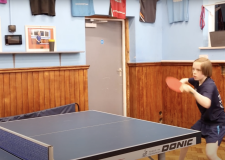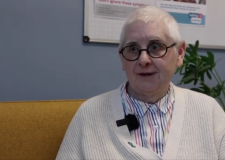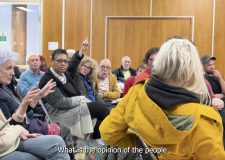Travellers – A Settlement
Sixteen new pitches are planned but the council says they won’t be enough. Frank le Duc reports

The problem of groups of people illegally setting up camp in parks and public spaces will continue, according to an official report. Travellers will have an extra 16 pitches on the edge of Brighton but these will not be enough to solve the long-running problem. The Green administration which runs Brighton and Hove City Council said that its new travellers strategy was a step in the right direction. The party added that a national and regional strategy were needed to deal with the issue properly.
The nub of the problem is that dozens of gypsies, travellers and van dwellers have occupied public spaces in Brighton and Hove year in year out. Most of the people visiting Brighton and Hove are travellers, rather than gypsies, and most of those are Irish travellers. Their favoured places to stay have included car parks, nature reserves and playing fields.
They have become more visible as a number of traditional stopping places in the area around Brighton have been closed off to them. The anti-social and sometimes criminal activities of a minority have created tensions with people living near their temporary pitches. One public meeting to discuss the subject in Woodingdean last year attracted more than a thousand people.
The van dwellers are not officially classed as travellers but in the eyes of many residents they are a related problem. They can often be seen parked on the seafront at the King Alfred in Hove or Black Rock in Brighton, for example, and around Preston Park.
One of the objections made by residents is that van dwellers and travellers take over parking spaces and public spaces intended for everyone. Another is that they don’t go to camp sites where they would have to pay for their stay. And another is that by their very presence, local taxpayers are physically excluded or feel excluded from using the facilities for which they have paid.
A CONTENTIOUS SUBJECT
This contentious subject has come up at a number of recent council meetings, including the cabinet meeting last Thursday (15 March). And the new three-year strategy is due to be discussed at a meeting of the full council this Thursday (22 March). It was the subject of a walk-out by two councillors who felt that they were being labelled racist at the Community Safety Forum, also last week.
The two Conservative councillors who walked out, Dawn Barnett and Tony Janio, have been outspoken in sticking up for concerned residents. Two Green cabinet members, Ben Duncan and Pete West, have been equally concerned to make the case for gypsies and travellers. They have spoken about discrimination and abuse suffered by travellers even when dealing with schools and doctors’ surgeries.
They say that travellers are marginalised too often as they try to live their traditional nomadic lifestyle. This often involves looking for seasonal work in resorts like Brighton. It can include travelling with shows and fairs, labouring in building and related trades, and horticultural work.
Brighton has proved attractive for many reasons. It’s a great place of course, but it’s also where the A27 coast road and A23 London road meet, giving good access to a wide area for work. Many have family members who have settled in this area too. The south east has just 43 transit pitches for gypsies and travellers and 23 of them – more than half – are in Brighton. But there are no permanent pitches in the city. The new strategy proposes building 16 permanent pitches next to the transit site at Horsdean, just north of the A27 Brighton bypass by the junction with the A23. It will take up to two years to be ready.
A POLICY OF TOLERANCE
The Conservatives say that the Greens have been too tolerant and too welcoming, and as a result more travellers have come here. This, they say, has exacerbated tensions in the area. The Greens say that the numbers have changed little. Initially last year they moved groups on so quickly that there appeared to be more illegal camps. In part this impression was created because sometimes a camp would be evicted from one site and split into two or three smaller groups, occupying two or three smaller sites.
As for being too tolerant, one Green said that the Conservatives refurbished the existing transit site – and quite properly so. And that the current strategy for dealing with incursions was the one put in place by the Conservatives. The idea of tolerated sites, such as 19 Acres, off Devil’s Dyke Road, again close to the bypass, is sanctioned by the government, according to the council. An unauthorised camp on the site at the moment is due to be evicted during the school holidays if those already there haven’t left beforehand.
Part of the Greens’ strategy is to try to calm some of the tensions. They want to break down some of the mistrust and misunderstanding between people who live here and those who pitch up. The subject, though, has proved among the most divisive between the Greens and the Conservatives since the change of power last year with little sign of any change in prospect.
THE NEW SITE
The proposed permanent site for gypsies and travellers is to be built at Horsdean, on the northern edge of Patcham and the southern edge of the South Downs National Park. It was once farmland and is close to the junction of the A23 and A27. A transit site with 23 pitches is already there, off Braypool Lane, just north of the bypass and east of London Road.
Horsdean was one of about 50 sites that the council considered.
Others included:
• The Brighton Centre
• Black Rock
• The King Alfred,
• The old Stanley Deason School site, now part of City College
• The Hollingdean depot
• Hangleton Bottom
• The old Falmer High School site
• Waterhall
• Preston Barracks
• The old Circus Street fruit and veg market
• Patcham Court Farm
• Patcham Place recreation ground
• Preston Barracks
• Land next to Portslade Town Hall.
One serious contender was a site between Coldean Lane and the Brighton bypass next to, but cut off from, Stanmer Park. It was ruled out because it is not flat enough, site access would be difficult and providing services such as power and water would be problematic and costly.
Councillor Geoffrey Theobald, represents Patcham and is the opposition Conservative group leader. He criticised the choice of Horsdean, saying: “It’s wholly inappropriate to put a transit site and a permanent site next to each other. It’s in the South Downs National Park and if we mean anything by the park then you have to question that.
“When the bypass was built it was supposed to be a corset around the city. We were told that there would be no development north of the bypass. That’s why Brighton and Hove Albion couldn’t build a stadium at Waterhall. And when the transit site was being considered, it was vigorously opposed by the national park authority’s predecessor, the South Downs Joint Committee or the South Downs Conservation Board.
“There are also concerns about the safety of the water supply. There’s an aquifer underneath the site and it runs right across the site. I would want to be assured that the Environment Agency had looked into this. Concerns about the possibility of contamination have been raised with me.”
The council was given a £1.7 million grant by the government to build permanent pitches at Sheepcote Valley. The site was chosen when the Tories ran the council. Tests found that the soil there was too heavily contaminated though. The council expects to be able to spend the grant money on its Horsdean proposal although this has not yet been confirmed.
The new site would not be ready until late 2013 or early 2014, if it is given planning permission. And it will cater for only some of the demand for pitches in the area. Which is why the council readily admits that we can still expect camps to appear around Brighton and Hove for years to come. It’s a settlement of sorts.
OPINION
A CASE FOR THE COURTS
Mike Weatherley, the Conservative MP for Hove, asked about illegal traveller sites in the House of Commons last week. He asked the Minister of State for Justice, Nick Herbert, how many prosecutions had been brought for camping illegally in vehicles in public parks over the past year. Mr Herbert said that there were 38 cases in 2010, the most recent year for which figures were available.
He told Mr Weatherley that the government was strengthening the powers available to the police to deal with illegal encampments through the Police Reform and Social Responsibility Act 2011.
Mr Weatherley said: “I find it absolutely shocking that the number of prosecutions that have been made is so low. There were just 38 in the whole country yet residents would have wanted to see this number in Brighton and Hove alone.
“It is completely unacceptable when camps are illegally set up on our beloved green spaces. People should not be allowed to break the law and simply get away with it. It is hard to pinpoint the reasons why the response has been so weak but I would suggest that the naivety of Brighton & Hove City Council and a general obsession with political correctness is to blame.
“I am extremely pleased that this government is taking serious action to help local authorities deal with such pressing issues as these and will continue to do all that I can to ensure that our green spaces are available for all to enjoy – not just those who want to have a free camping holiday on the back of the taxpayer.”
PETE WEST
CABINET MEMBER FOR THE ENVIRONMENT AND SUSTAINABILITY
“We have a lower proportion of traveller households in the city than the south east average yet due to the shortage of stopping places for those travellers visiting Brighton and Hove they are up to four times more likely to have to set up unauthorised encampments here than in the rest of the region.
The national shortage of sites causes tensions between traveller groups and local residents particularly when unauthorised encampments are set up in parks or playing fields. We estimate that, nationally, less than 6 per cent of all travellers are on unauthorised encampments yet myths surrounding traveller communities, often fuelled by the media and the anti-social behaviour caused by a small minority, are inflaming emotions, tensions and mistrust.
“Brighton and Hove prides itself on being a tolerant and welcoming city. We recognise that embracing diversity helps the city to thrive and gives it a vibrancy that other areas find hard to match. However, sometimes tensions arise between communities which if not dealt with undermine our reputation. It is in these circumstances that the council, working with our partners, has a duty to act.
“In summer 2011 we tested a part of our new approach. Rather than continuing to push travellers around the city causing encampments that would impact on many local communities, we allowed one group to stay longer at an out of town location with a lesser impact.
“As a direct result of this there was a 40 per cent reduction in the number of encampments between July and September when compared to the previous three months. We would normally expect to see an increase at this time of year yet there were 25 per cent fewer encampments than during the same time in the previous year.
“We also worked with the police to support Operation Monza during the summer where the police made daily visits to encampments to improve relations with travellers and reassure residents. During this period, not a single encampment was moved because of nuisance or anti-social behaviour and our teams saw a marked decrease in resident complaints.
“The overall shortage of temporary and permanent stopping places at a national level means that we may always have unauthorised encampments but our strategy aims to limit them in sensitive locations. A national approach is required as is a regional one, but in the absence of a lead from central government we have to fall back on local solutions.
“We are taking a firm but fair approach in dealing with encampments that respects the nomadic lifestyle and needs of traveller communities and balances this with the interests of local residents.”



















